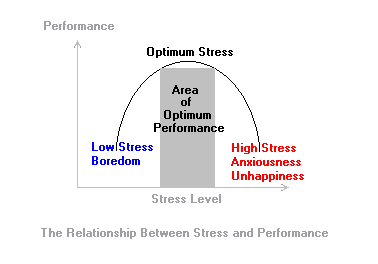Optimum Stress Levels
The level of stress under which you operate is important: if you are not under enough stress, then you may find that your performance suffers because you are bored and unmotivated. If you are under too much stress, then you will find that your results suffer as you find it difficult to focus on technique and fail to flow with the performance.
The graph below shows the relationship between stress and quality of performance:

Where stress is low, you may find that your performance is low because you become bored, lack concentration and lack motivation. If this state persists for a long time, then you may find the sport tedious, and give it up.
Where stress is too high, your performance can suffer from all the symptoms of stress. Your flow can be disrupted, you can be distracted, and competition can become threatening and unpleasant.
In the middle, at a moderate level of stress, there is a zone of best performance. If you can keep yourself within this zone, then you will be sufficiently aroused to give a high quality performance, while not being over-stressed and unhappy.
This zone of optimum performance is in a different place and is a different shape for different people. Some people may operate most effectively at a level of stress that would leave other people either bored or in pieces. It is possible that someone who functions superbly in a low level competition might experience difficulties in high level competition. Alternatively someone who performs only moderately at low level of competition might give exceptional performances under extreme pressure.
Not only will the zones of optimum performance be in different places for different athletes, they will also be different heights and different widths. This is why you must take responsibility for controlling your own levels of stress, particularly in a team situation: if the team generally needs motivation, but you are in an optimum zone, then paying attention to a motivating team talk may move you to a state of being over-stressed. Similarly if some team members need to be relaxed, then relaxation techniques applied to an entire team may move you to a state of bored demotivation.
You may also find that fine and complex skills are less tolerant to stress than simple skills - your zone of optimum performance may be narrower for very difficult skills than for the basic skills of the sport.
If you have stress monitoring equipment, and can score your performance, then this gives you hard, objective figures to use in your training log. If you do not have the ability to do this, then record your subjective views of the stress levels you felt and the quality of the session.
After a time review the training log - this should give you some good information on the way that you respond to stress. This information will help you to decide and implement a stress management program that is appropriate to the different sporting situations you find yourself in.
The graph below shows the relationship between stress and quality of performance:

Where stress is low, you may find that your performance is low because you become bored, lack concentration and lack motivation. If this state persists for a long time, then you may find the sport tedious, and give it up.
Where stress is too high, your performance can suffer from all the symptoms of stress. Your flow can be disrupted, you can be distracted, and competition can become threatening and unpleasant.
In the middle, at a moderate level of stress, there is a zone of best performance. If you can keep yourself within this zone, then you will be sufficiently aroused to give a high quality performance, while not being over-stressed and unhappy.
This zone of optimum performance is in a different place and is a different shape for different people. Some people may operate most effectively at a level of stress that would leave other people either bored or in pieces. It is possible that someone who functions superbly in a low level competition might experience difficulties in high level competition. Alternatively someone who performs only moderately at low level of competition might give exceptional performances under extreme pressure.
Not only will the zones of optimum performance be in different places for different athletes, they will also be different heights and different widths. This is why you must take responsibility for controlling your own levels of stress, particularly in a team situation: if the team generally needs motivation, but you are in an optimum zone, then paying attention to a motivating team talk may move you to a state of being over-stressed. Similarly if some team members need to be relaxed, then relaxation techniques applied to an entire team may move you to a state of bored demotivation.
You may also find that fine and complex skills are less tolerant to stress than simple skills - your zone of optimum performance may be narrower for very difficult skills than for the basic skills of the sport.
Finding Your Optimum Stress Level
An effective way of finding the stress level at which you operate best is to keep a training and performance log. In this record the quality of every training session or performance, along with the level of stress that you felt during that performance.If you have stress monitoring equipment, and can score your performance, then this gives you hard, objective figures to use in your training log. If you do not have the ability to do this, then record your subjective views of the stress levels you felt and the quality of the session.
After a time review the training log - this should give you some good information on the way that you respond to stress. This information will help you to decide and implement a stress management program that is appropriate to the different sporting situations you find yourself in.